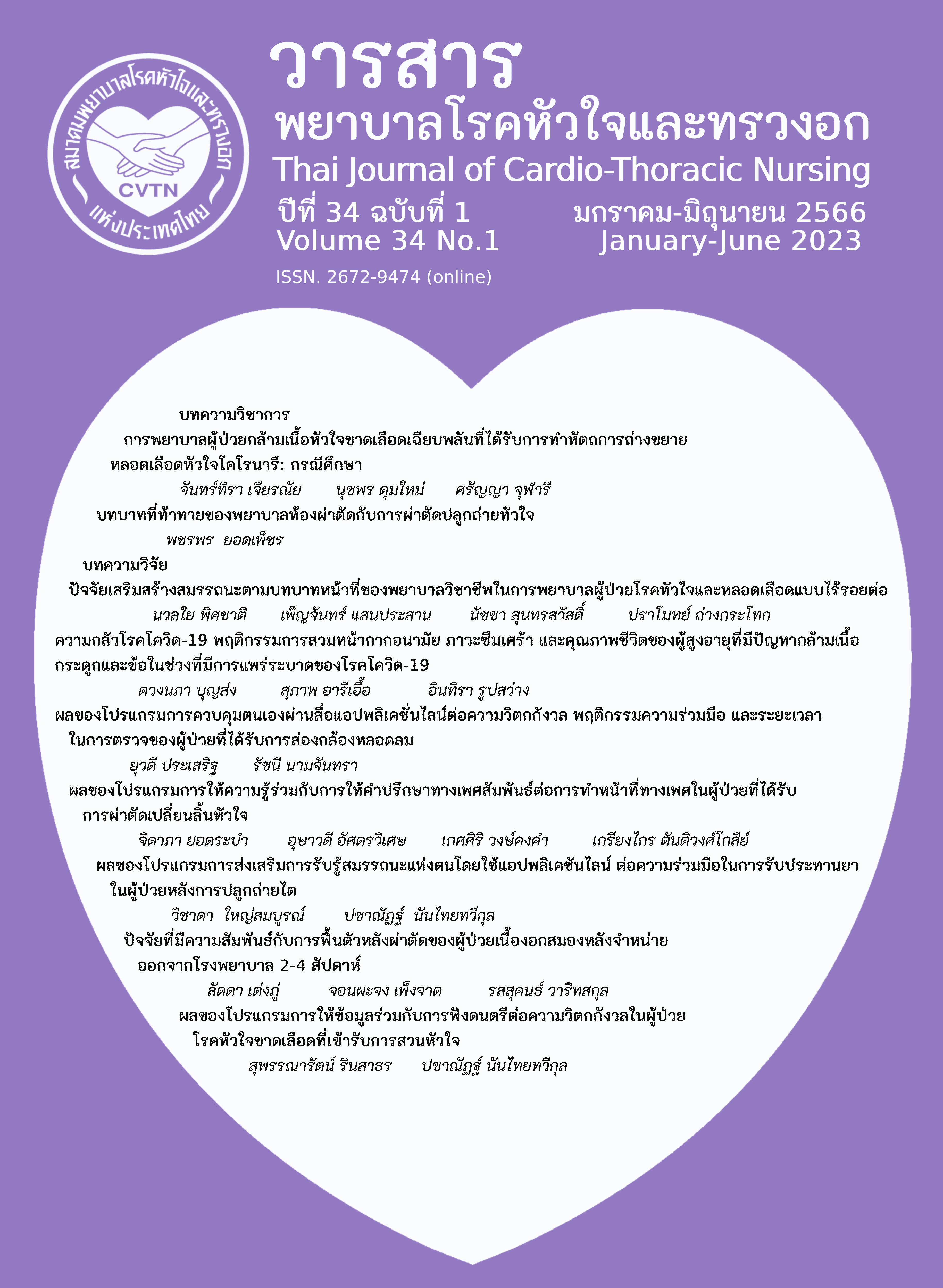The effect of self-efficacy promoting program using LINE application on medication adherence among patients post kidney transplantation
Keywords:
medication adherence, self-efficacy, post kidney transplantation, line applicationAbstract
The purpose of this quasi-experimental research was to study the effects of a self-efficacy program, using the LINE application, on medication adherence among post kidney transplant patients. The sample consisted of fifty patients with post kidney transplant more than six months visiting the out-patient clinic at King Chulalongkorn Memorial Hospital. The participants were divided equally 25 persons for each group into experimental and control groups. The control group received the usual care program while the experimental group received an intervention regarding a self-efficacy program based on the Bandura Model using the LINE application to promote medication adherence. The program was conducted for eight weeks. The questionnaires included demographic information, the Medication Adherence Report Scale: MARS, and a Thai version of the Self-efficacy for Appropriate Medication Use Scale (SEAMS). Data were analyzed using percent, mean, standard deviation, and independent t-test.
The results revealed that the average medication adherence score, after participating in the self-efficacy program using the LINE application, was significantly higher than the average score before participating in the program at the .05 statistical level of significance. Additionally, the mean medication adherence score of the experimental group, after participating in the perceived self-efficacy program using the LINE application, was significantly higher than that of the control group at the 0.05 level of significance.
This study suggests that a self-efficacy program using the LINE application can improve the medication adherence of patients after undergoing a kidney transplantation.
References
Thai Transplantation Society. Thai transplantation report year 2020. Thai transplantation society. Bangkok: Thai transplantation; 2020. (In Thai).
Saengsuai I, Navicharern R. A study of self-care behavior in patients post kidney transplantation in northeast region. [Master thesis of nursing science]. Bangkok: Chulalongkorn University; 2018. (In Thai).
Sopitsakol U, Prapaipanich W, Maneesriwongul W. Factors related to medication adherence in kidney transplant recipients. Ramathibodi Nursing Journal. 2018; 24(3): 328-44. (In Thai).
Oberlin S.R, Parente S.T, Pruett TL. Improving medication adherence among kidney transplant recipients: findings from other industries, patient engagement and behavioral economics-a scoping review. SAGE open medicine. 2016; 4, 2050312115625026.
De Geest S, Schäfer‐Keller P, Denhaerynck K, Thannberger N, Köfer S, Bock A, Steiger J. Supporting medication adherence in renal transplantation (SMART): a pilot RCT to improve adherence to immunosuppressive regimens. Clin. Transplant. 2006; 20(3): 359-68.
Rebafka, A. Medication adherence after renal transplantation—a review of the literature. J Ren Care. 2016; 42(4): 239-56.
Tsapepas D, Langone A, Chan L, Wiland A, McCague K, Chisholm-Burns M. A longitudinal assessment of adherence with immunosuppressive therapy following kidney transplantation from the Mycophenolic Acid Observational Renal Transplant (MORE) study. Ann. Transplant. 2014; 19: 174-81.
Massey E K, Tielen M, Laging M, Beck D K, Khemai R, van Gelder T, Weimar W. The role of goal cognitions, illness perceptions and treatment beliefs in self-reported adherence after kidney transplantation: a cohort study. J Psychosom Res. 2013; 75(3): 229-34.
Weng L C, Yang Y C, Huang H L, Chiang Y J, Tsai Y H. Factors that determine self‐reported immunosuppressant adherence in kidney transplant recipients: a correlational study. J. Adv. Nurs. 2017; 73(1): 228-39.
Denhaerynck K, Steiger J, Bock A, Schäfer‐Keller P, Köfer S, Thannberger N, De Geest S. Prevalence and risk factors of non‐adherence with immunosuppressive medication in kidney transplant patients. Am. J. Transplant. 2017; 7(1): 108-116.
Chisholm-Burns MA, Kwong WJ, Mulloy LL, Spivey CA. Nonmodifiable characteristics associated with nonadherence to immunosuppressant therapy in renal transplant recipients. Am J Health Syst Pharm. 2008 Jul 1;65(13):1242-7. doi: 10.2146/ajhp070630. PMID: 18574014.
Griva K, Davenport A, Harrison M, Newman SP. Non-adherence to immunosuppressive medications in kidney transplantation: intent vs. forgetfulness and clinical markers of medication intake. Ann Behav Med. 2012 Aug;44(1):85-93. doi: 10.1007/s12160-012-9359-4. PMID: 22454221.
Maissiat da Silveira G, Marin MS, Fuzinatto Rafaela DR. Adherence to immunosuppressive treatment in post-renal transplant patients: a descriptive-exploratory study. Online braz. j. nurs. [Internet]. 2013 [ cited 2023 Jan 10] 12(2). Available from: https://www.objnursing.uff.br/index.php/nursing/article/view/3865/html
Paterson T S, O’Rourke N, Shapiro R J, Loken Thornton W. Medication adherence in renal transplant recipients: a latent variable model of psychosocial and neurocognitive predictors. PloS one 2018; 13(9): e0204219.
Russell CL, Ashbaugh C, Peace L, Cetingok M, Hamburger KQ, Owens S, Winsett RP. Time‐in‐a‐bottle (TIAB): a longitudinal, correlational study of patterns, potential predictors, and outcomes of immunosuppressive medication adherence in adult kidney transplant recipients. Clin. Transplant. 2013; 27(5): E550-E590.
Bandura A. Self-efficacy: the exercise of control. New York: Freeman and Company; 1997.
Polsook R, Aungsuroch Y, Thongvichean T. The effect of self-efficacy enhancement program on medication adherence among post-acute myocardial infarction. Appl Nurs Res. 2016; 32: 67-72.
Horne R, Weinman J. Self-regulation and self-management in asthma: exploring the role of illness perceptions and treatment beliefs in explaining non-adherence to preventer medication. Psychol Health. 2002; 17(1): 17-32.
Polsook R, Aungsuroch Y, Thanasilp S, Duffy J. Validity and reliability of Thai version of questionnaire measuring self-efficacy for appropriate medication use scale among Thai with post-myocardial infarction. Songklanakarin J. Sci. Technol. 2014; 36 (4): 411-17.
Suthirit S, Pinchaleaw D, Keskomon T. The effectiveness of a Self-regulation program with Line Application among weight volunteers, Tharongchang District, Surat Thani Province. Journal of police nurse. 2018; 10(2): 330-339. (In Thai).
Suntharapot S. Effectiveness of text messaging via application LINE on adherence to the antiretroviral drug among HIV and AIDS patients in Khaoyoi Hospital Phetchaburi. Thai Bulletin of Pharmaceutical Sciences. 2022; 17(2): 83-99 (In Thai).
Downloads
Published
How to Cite
Issue
Section
License
Copyright (c) 2023 Thai Journal of Cardio-Thoracic Nursing

This work is licensed under a Creative Commons Attribution-NonCommercial-NoDerivatives 4.0 International License.
บทความนี้ยังไม่เคยตีพิมพ์หรืออยู่ในระหว่างส่งไปตีพิมพ์ในวารสารอื่น ๆ มาก่อน และกองบรรณาธิการขอสงวนสิทธิ์ในการตรวจทาน และแก้ไขต้นฉบับตามเกณฑ์ของวารสาร ในกรณีที่เรื่องของท่านได้ได้รับการตีพิมพ์ในวารสารฉบับนี้ถือว่าเป็น ลิขสิทธิ์ของวารสารพยาบาลโรคหัวใจและทรวงอก






